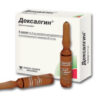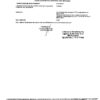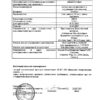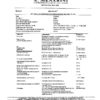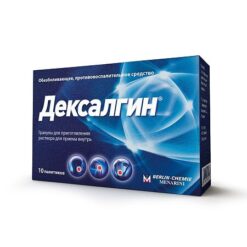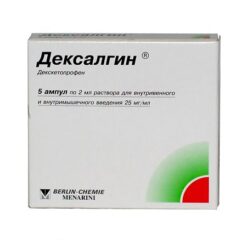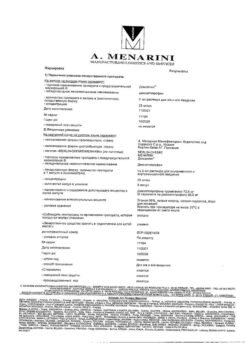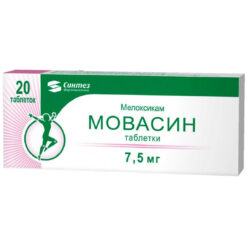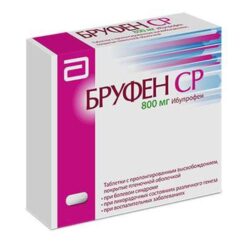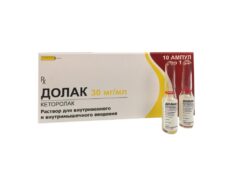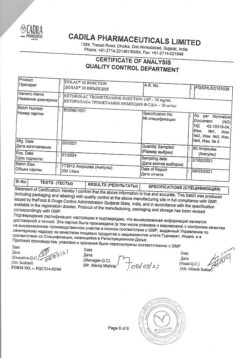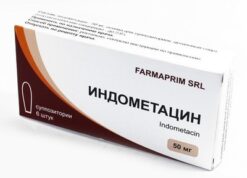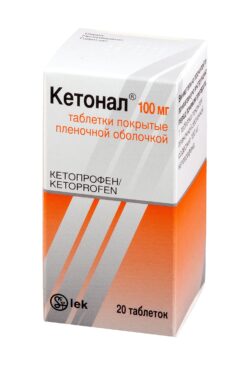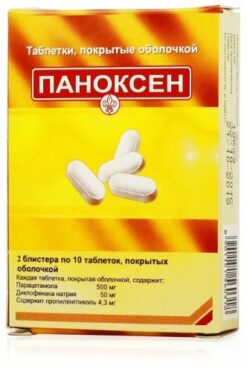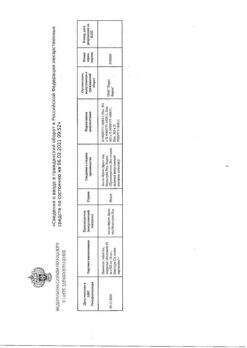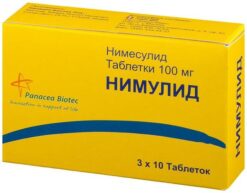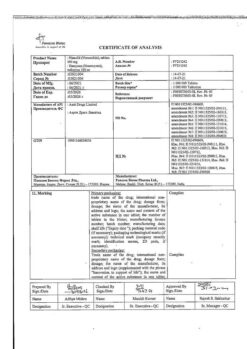No products in the cart.
Dexalgin, 25 mg/ml 2 ml 10 pcs
€16.08 €13.40
Description
Pharmaceutical group: NSAIDs.
Pharmacological action: Dexalgin is a nonsteroidal anti-inflammatory drug (NSAID). It has analgesic, anti-inflammatory and antipyretic effects. The mechanism of action is associated with inhibition of prostaglandin synthesis at the level of COX-1 and COX-2.
The analgesic effect occurs 30 minutes after parenteral administration. Duration of analgesic effect after administration of 50 mg is 4-8 hours.
In combined therapy with opioid analgesics dexectoprofen trometamol significantly (up to 30-45%) reduces the need for opioids.
Indications
Indications
— relief of pain syndrome of various origins (including postoperative pain, pain with bone metastases, post-traumatic pain, pain with renal colic, algodismenorrhea, sciatica, sciatica, neuralgia, toothache);
– symptomatic treatment of acute and chronic inflammatory, inflammatory-degenerative and metabolic diseases of the musculoskeletal system (including rheumatoid arthritis, spondyloarthritis, arthrosis, osteochondrosis).
Pharmacological effect
Pharmacological effect
Pharmaceutical group: NSAIDs.
Pharmaceutical action: Dexalgin is a non-steroidal anti-inflammatory drug (NSAID). It has analgesic, anti-inflammatory and antipyretic effects. The mechanism of action is associated with inhibition of prostaglandin synthesis at the level of COX-1 and COX-2.
The analgesic effect occurs 30 minutes after parenteral administration. The duration of the analgesic effect after administration at a dose of 50 mg is 4-8 hours.
When combined with the opioid analgesics dexketoprofen, trometamol significantly (up to 30-45%) reduces the need for opioids.
Special instructions
Special instructions
In patients with disorders of the digestive system or a history of gastrointestinal diseases, constant monitoring is required. If gastrointestinal bleeding or ulceration occurs, therapy with Dexalgin® should be discontinued.
Because All NSAIDs can inhibit platelet aggregation and increase bleeding time due to slowing prostaglandin synthesis; controlled clinical studies have studied the simultaneous administration of dexketoprofen trometamol and low molecular weight heparin preparations in prophylactic doses in the postoperative period. No effect on coagulation parameters was observed. However, when prescribing Dexalgin® with other drugs that affect blood clotting, careful medical monitoring is required.
Like other NSAIDs, Dexalgin® can lead to increased levels of creatinine and nitrogen in the blood plasma. Like other prostaglandin synthesis inhibitors, Dexalgin® may have side effects on the urinary system, which can lead to the development of glomerulonephritis, interstitial nephritis, papillary necrosis, nephrotic syndrome and acute renal failure.
During therapy with Dexalgin®, as with other NSAIDs, a slight transient increase in some liver parameters, as well as a significant increase in the level of AST and ALT in the blood serum, may be observed. At the same time, monitoring of liver and kidney functions is necessary in elderly patients. In case of a significant increase in the corresponding indicators, Dexalgin® should be discontinued.
Like other NSAIDs, dexketoprofen trometamol may mask the symptoms of infectious diseases. In case of symptoms of a bacterial infection or deterioration of health during therapy with Dexalgin®, the patient should inform the doctor.
Each ampoule of Dexalgin® contains 200 mg of ethanol.
Impact on the ability to drive vehicles and operate machinery
Due to possible dizziness and drowsiness during treatment with Dexalgin®, the ability to concentrate and the speed of psychomotor reactions may decrease.
Active ingredient
Active ingredient
Dexketoprofen
Composition
Composition
1 ml:
– dexketoprofen trometamol 36.9 mg, which is resp. content of dexketoprofen 25 mg
Excipients:
ethanol 96%,
sodium chloride,
sodium hydroxide,
water d/i.
Contraindications
Contraindications
– peptic ulcer of the stomach and duodenum;
– history of gastrointestinal bleeding, other active bleeding (including suspected intracranial bleeding), anticoagulant therapy;
– gastrointestinal diseases (Crohn’s disease, ulcerative colitis);
– severe liver dysfunction (10-15 points on the Child-Pugh scale);
— severe renal dysfunction (creatinine clearance < 50 ml/min);
— bronchial asthma (including a history);
– severe heart failure;
— treatment of pain syndrome during coronary artery bypass grafting;
– hemorrhagic diathesis or other coagulation disorders;
– children’s age;
– hypersensitivity to dexketoprofen or other NSAIDs or to any of the excipients included in the drug Dexalgin.
Contraindicated for epidural, intrathecal or intrathecal administration due to the ethanol contained in the drug.
The drug should be used with caution if you have a history of allergic conditions; disorders of the hematopoietic system; for SLE or mixed connective tissue diseases; simultaneously with other medications; in case of predisposition to hypovolemia; with ischemic heart disease; in elderly patients (over 65 years old).
Side Effects
Side Effects
Frequency of side effects: often (1-10%), infrequently (0.1-1%), rarely (0.01-0.1%), very rarely (less than 0.01%, including individual reports).
From the hematopoietic system: rarely – anemia; very rarely – neutropenia, thrombocytopenia.
From the side of the central nervous system: infrequently – headache, dizziness, insomnia, drowsiness; rarely – paresthesia.
From the senses: infrequently – blurred vision; rarely – tinnitus.
From the cardiovascular system: infrequently – arterial hypotension, feeling of heat, hyperemia of the skin; rarely – extrasystole, tachycardia, arterial hypertension, peripheral edema, superficial thrombophlebitis.
From the respiratory system: rarely – bradypnea; very rarely – bronchospasm, dyspnea.
From the digestive system: often – nausea, vomiting; uncommon – abdominal pain, dyspepsia, diarrhea, constipation, hematemesis, dry mouth; rarely – erosive and ulcerative lesions of the gastrointestinal tract, including bleeding and perforation, anorexia, increased activity of liver enzymes, jaundice; very rarely – pancreatic damage, liver damage.
From the urinary system: rarely – polyuria, renal colic; very rarely – nephritis or nephrotic syndrome.
From the reproductive system: rarely – in women – menstrual irregularities, in men – dysfunction of the prostate gland.
From the musculoskeletal system: rarely – muscle spasm, difficulty moving in the joints.
Dermatological reactions: sometimes – dermatitis, rash, sweating; rarely – acne; very rarely – photosensitivity.
Allergic reactions: rarely – urticaria; very rarely – severe skin reactions (Stevens-Johnson syndrome, Lyell’s syndrome), angioedema, allergic dermatitis.
Metabolism: rarely – hyperglycemia, hypoglycemia, hypertriglyceridemia.
From laboratory parameters: rarely – ketonuria, proteinuria.
Local and general reactions: often – pain at the injection site; uncommon – inflammatory reaction, hematoma, hemorrhage at the injection site, feeling of heat, chills, fatigue; rarely – back pain, fainting, fever; very rarely – anaphylactic shock, facial swelling.
Other: aseptic meningitis, occurring mainly in patients with systemic lupus erythematosus or mixed connective tissue diseases, hematological disorders (purpura, aplastic and hemolytic anemia, rarely – agranulocytosis and bone marrow hypoplasia).
Interaction
Interaction
Undesirable combinations:
The simultaneous administration of several NSAIDs, including salicylates in high doses (more than 3 g / day) increases the risk of gastrointestinal bleeding and ulcers due to the synergy of action.
When used simultaneously with oral anticoagulants, heparin in doses exceeding prophylactic doses, and ticlopidine, the risk of bleeding increases due to inhibition of platelet aggregation and damage to the gastrointestinal mucosa.
NSAIDs increase the concentration of lithium in the blood plasma, up to toxic levels, and therefore this indicator must be monitored when prescribing, changing the dose and after discontinuation of NSAIDs.
When used with methotrexate in high doses (15 mg/week or more), the hematological toxicity of methotrexate increases due to a decrease in its renal clearance during NSAID therapy.
When used simultaneously with hydantoins and sulfonamide drugs, there is a risk of increased toxic effects of these drugs.
Combinations requiring caution:
If simultaneous use with diuretics and ACE inhibitors is necessary, it should be taken into account that NSAID therapy is associated with the risk of developing acute renal failure in patients with dehydration (decreased glomerular filtration due to inhibition of prostaglandin synthesis). NSAIDs may reduce the hypotensive effect of some drugs. When coadministered with diuretics, ensure that the patient’s fluid balance is adequate and monitor renal function before prescribing NSAIDs.
When used simultaneously with methotrexate in low doses (less than 15 mg/week), the hematological toxicity of methotrexate may increase due to a decrease in its renal clearance during NSAID therapy. Blood cell counts should be monitored weekly during the first weeks of concomitant therapy. In the presence of even mild renal dysfunction, as well as in elderly people, careful medical supervision is necessary.
When used simultaneously with pentoxifylline, the risk of bleeding increases. Intensive clinical monitoring and frequent monitoring of bleeding time (blood clotting time) is necessary.
When used concomitantly with zidovudine, there is a risk of increased toxicity to red blood cells due to effects on reticulocytes, with the development of severe anemia one week after administration of NSAIDs. It is necessary to control all blood cells and reticulocytes after 1-2 weeks. after starting NSAID therapy.
It is possible that the hypoglycemic effect of sulfonylurea derivatives may be enhanced due to its displacement from sites of binding to plasma proteins under the influence of NSAIDs.
When used simultaneously with low molecular weight heparin drugs, the risk of bleeding increases.
Combinations to take into account:
NSAIDs may reduce the hypotensive effect of beta-blockers due to inhibition of prostaglandin synthesis.
When used concomitantly with cyclosporine and tacrolimus, NSAIDs may increase nephrotoxicity, which is mediated by the action of renal prostaglandins. During combination therapy, renal function should be monitored.
When prescribed simultaneously with thrombolytics, the risk of bleeding increases.
When used simultaneously with probenecid, an increase in plasma concentrations of NSAIDs is possible, which may be due to inhibition of renal secretion and/or conjugation with glucuronic acid. This requires adjustment of the NSAID dose.
NSAIDs can cause an increase in the concentration of cardiac glycosides in the blood plasma.
Due to the theoretical risk of changes in the effectiveness of mifepristone under the influence of prostaglandin synthesis inhibitors, NSAIDs should not be prescribed earlier than 8-12 days after discontinuation of mifepristone.
Data obtained from experimental studies in animals indicate a high risk of developing convulsions when NSAIDs are prescribed during therapy with high doses of ciprofloxacin.
Pharmaceutical interactions:
Dexalgin® should not be mixed in the same syringe with a solution of dopamine, promethazine, pentazocine, pethidine or hydroxyzine (a precipitate will form).
Dexalgin® can be mixed in one syringe with a solution of heparin, lidocaine, morphine and theophylline.
A diluted solution of Dexalgin® for infusion should not be mixed with promethazine or pentazocine.
A diluted solution of Dexalgin® for infusion is compatible with the following injection solutions: dopamine, heparin, hydroxyzine, lidocaine, morphine, pethidine and theophylline.
When diluted solutions of Dexalgin® for infusion are stored in plastic containers or when using infusion systems made from ethyl vinyl acetate, cellulose propionate, low-density polyethylene or polyvinyl chloride, absorption of the active substance by the listed materials does not occur.
Overdose
Overdose
Symptoms: nausea, anorexia, abdominal pain, headache, dizziness, disorientation, insomnia.
Treatment: symptomatic therapy; if necessary – gastric lavage, dialysis.
Manufacturer
Manufacturer
A. Menarini Manufacturing Logistics and Services S, Italy
Additional information
| Manufacturer | A.Menarini Manufechering Logistics and Services S, Italy |
|---|---|
| Medication form | solution |
| Brand | A.Menarini Manufechering Logistics and Services S |
Other forms…
Related products
Buy Dexalgin, 25 mg/ml 2 ml 10 pcs with delivery to USA, UK, Europe and over 120 other countries.





